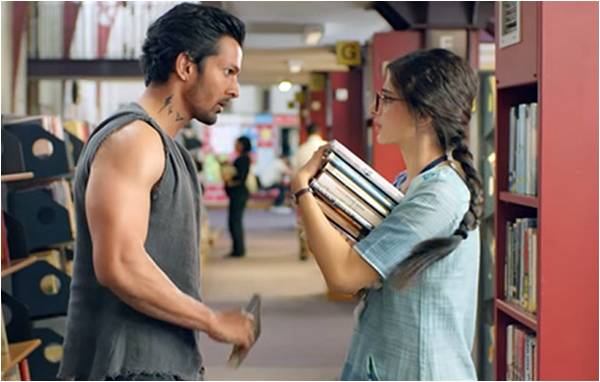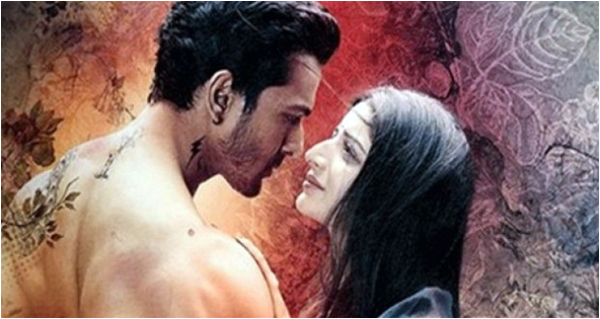
Back in 1813 when Jane Austen published her most popular novel, Pride and Prejudice, discussing matters of marriage so bluntly was not such a common trend. Consequently, not many readers - even modern ones - could read the underlying satire that she derived from the tragedy that encompassed every woman of “marriageable” age in Victorian England. Most readers who lacked that sense presumed that Austen was in fact advocating the notion that “a single man in possession of a good fortune must be in want of a wife”, while she was all the while trying to imply the opposite.
This, however, is not the case with Sanam Teri Kasam (I beg forgiveness from Jane Austen’s soul for drawing the comparison). With Sanam Teri Kasam, the case is exactly the opposite. But before the bash-fest begins, let us first find out what this Mawra Hocane-starrer actually is about.
Sanam Teri Kasam revolves around Saraswati (Mawra Hocane), a librarian whom no man wants to marry because of her “dull” nature (a la Urmila in Khoobsurat, 1999). Unluckily, Saraswati’s younger sister, Kaveri (Divyetta), is ready to marry her boyfriend but has to wait for her elder sister to get married before her parents can give her away. Therefore, Saraswati is pushed to find a groom for herself - but not any average guy would do. Like stereotypically ambitious South Asian parents, Saraswati’s mother and father want an “IIT or IIM” graduate as their son-in-law (for the uninformed, IIT stands for Indian Institute of Technology and IIM stands for Indian Institute of Management). Therefore, the hunt begins.

However, one rejection after another turns Saraswati and her parents hopelessly desperate and the younger sister, Kaveri, bitter. In desperation, Saraswati decides to get a makeover in order to attract more men’s attention. For this end, she seeks her neighbour, Inder’s help (Harshvardhan Rane, the male protagonist). Inder helps Saraswati in getting the makeover she desires, but himself falls in love with her in this process. And from this point onward, the movie goes downhill and into a pool of tears and depression.
Much of the story that has been recounted thus far by this scribe would ring many bells in most readers’ minds, showing how pedestrian the storyline is. Even though the film redeems itself to a degree in its latter half, pulling away from its cliché-laden, boring and usual introduction, nevertheless, it has very little originality to speak of.
Secondly, despite claiming to showcase elements of women empowerment, Sanam Teri Kasam has very little substance that supports this claim. For starters, the film revolves around a rather meek protagonist, whose sole purpose shown in the film is the pursuit and “acquisition” of a suitable husband - and this, by no means, in a satirical manner. Furthermore, the woman later on turns into a damsel in distress who requires her lover Inder to make her feel better when a prospective husband leaves her stranded at the altar, and later on, to fight for her cause in front of her own parents - not really the mark of a self-sufficient and strong woman. Therefore, I request potential viewers not to expect any traces of feminism in Sanam Teri Kasam. It steers clear of such ideas.
Lastly, and most positively, are the actors’ performances. Both the protagonists of the film, Mawra Hocane and Harshvardhan Rane are Bollywood debutants, and both of them must be praised for their respective performances. Both the actors did a commendable job in pulling off two roles that were emotionally challenging for different reasons. Harshvardhan Rane’s character Inder evolves as the film progresses, from a man who doesn’t have a care in the world to one who is willing to kill for the love of his life. This transition requires a considerable amount of artistic mastery on the part of the actor to deliver with accuracy, which Rane possesses in sufficient amount. Let us not forget that Sanam Teri Kasam might be Harshvardhan Rane’s Bollywood debut, but the actor has spent over five years acting in Telugu cinema, achieving much success.
Much like Rane is Mawra Hocane, who has acted in over twenty drama serials in her home country (which, of course, is Pakistan) before making her first Bollywood appearance. Hocane, too, has delivered a good acting performance in Sanam Teri Kasam, evidently using the years of experience she gained by playing damsels in distress in melodramatic Pakistani dramas. Unlike Rane’s Inder, Hocane’s Saraswati lacked complexity, yet, the circumstances that she is put through pose the actor personifying her a serious challenge. It is the accuracy with which Mawra delivers the required emotions in the various ups and downs of Saraswati’s life that make her Bollywood debut a good one - another feather in the Pakistani industry’s cap.
Khadija Mughal lives in Karachi
This, however, is not the case with Sanam Teri Kasam (I beg forgiveness from Jane Austen’s soul for drawing the comparison). With Sanam Teri Kasam, the case is exactly the opposite. But before the bash-fest begins, let us first find out what this Mawra Hocane-starrer actually is about.
Mawra Hocane drew upon years of experience playing 'damsel in distress' in melodramatic Pakistani serials
Sanam Teri Kasam revolves around Saraswati (Mawra Hocane), a librarian whom no man wants to marry because of her “dull” nature (a la Urmila in Khoobsurat, 1999). Unluckily, Saraswati’s younger sister, Kaveri (Divyetta), is ready to marry her boyfriend but has to wait for her elder sister to get married before her parents can give her away. Therefore, Saraswati is pushed to find a groom for herself - but not any average guy would do. Like stereotypically ambitious South Asian parents, Saraswati’s mother and father want an “IIT or IIM” graduate as their son-in-law (for the uninformed, IIT stands for Indian Institute of Technology and IIM stands for Indian Institute of Management). Therefore, the hunt begins.

However, one rejection after another turns Saraswati and her parents hopelessly desperate and the younger sister, Kaveri, bitter. In desperation, Saraswati decides to get a makeover in order to attract more men’s attention. For this end, she seeks her neighbour, Inder’s help (Harshvardhan Rane, the male protagonist). Inder helps Saraswati in getting the makeover she desires, but himself falls in love with her in this process. And from this point onward, the movie goes downhill and into a pool of tears and depression.
Much of the story that has been recounted thus far by this scribe would ring many bells in most readers’ minds, showing how pedestrian the storyline is. Even though the film redeems itself to a degree in its latter half, pulling away from its cliché-laden, boring and usual introduction, nevertheless, it has very little originality to speak of.
Secondly, despite claiming to showcase elements of women empowerment, Sanam Teri Kasam has very little substance that supports this claim. For starters, the film revolves around a rather meek protagonist, whose sole purpose shown in the film is the pursuit and “acquisition” of a suitable husband - and this, by no means, in a satirical manner. Furthermore, the woman later on turns into a damsel in distress who requires her lover Inder to make her feel better when a prospective husband leaves her stranded at the altar, and later on, to fight for her cause in front of her own parents - not really the mark of a self-sufficient and strong woman. Therefore, I request potential viewers not to expect any traces of feminism in Sanam Teri Kasam. It steers clear of such ideas.
Lastly, and most positively, are the actors’ performances. Both the protagonists of the film, Mawra Hocane and Harshvardhan Rane are Bollywood debutants, and both of them must be praised for their respective performances. Both the actors did a commendable job in pulling off two roles that were emotionally challenging for different reasons. Harshvardhan Rane’s character Inder evolves as the film progresses, from a man who doesn’t have a care in the world to one who is willing to kill for the love of his life. This transition requires a considerable amount of artistic mastery on the part of the actor to deliver with accuracy, which Rane possesses in sufficient amount. Let us not forget that Sanam Teri Kasam might be Harshvardhan Rane’s Bollywood debut, but the actor has spent over five years acting in Telugu cinema, achieving much success.
Much like Rane is Mawra Hocane, who has acted in over twenty drama serials in her home country (which, of course, is Pakistan) before making her first Bollywood appearance. Hocane, too, has delivered a good acting performance in Sanam Teri Kasam, evidently using the years of experience she gained by playing damsels in distress in melodramatic Pakistani dramas. Unlike Rane’s Inder, Hocane’s Saraswati lacked complexity, yet, the circumstances that she is put through pose the actor personifying her a serious challenge. It is the accuracy with which Mawra delivers the required emotions in the various ups and downs of Saraswati’s life that make her Bollywood debut a good one - another feather in the Pakistani industry’s cap.
Khadija Mughal lives in Karachi

